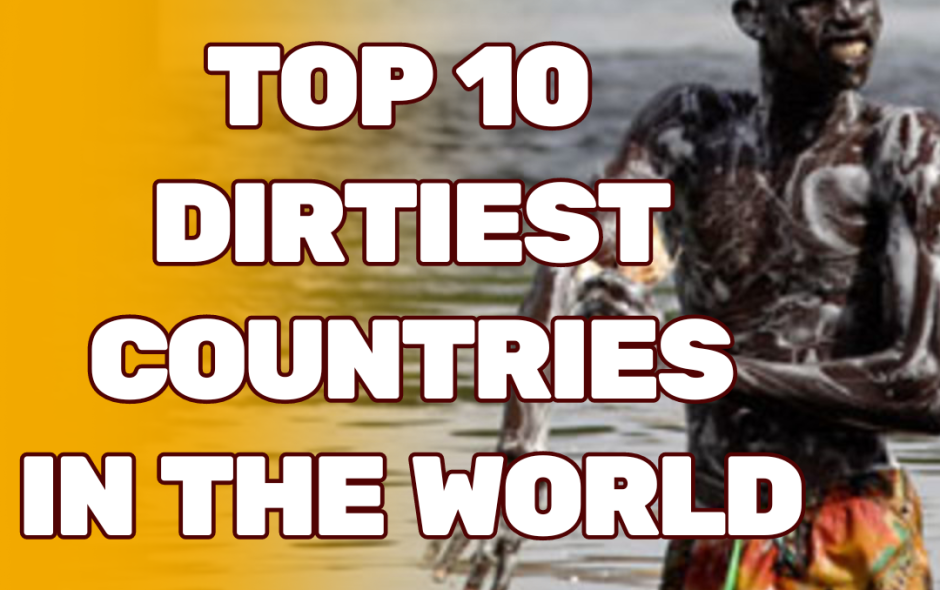Top 10 Dirtiest Countries in the World as of 2024: A Closer Look
Pollution remains a significant issue globally, affecting the environment and public health. Here, we take a look at the top 10 dirtiest countries in the world, examining the sources and impacts of pollution in each.
1. Chad
Nestled in Central Africa, Chad is grappling with severe environmental issues. Deforestation, desertification, and water contamination plague the nation. Forests are rapidly disappearing to make way for agriculture and fuelwood, leading to increased soil erosion, reduced biodiversity, and higher greenhouse gas emissions. This environmental degradation severely impacts Chad’s ecosystem and public health.
2. Mongolia
Strategically located between China and Russia, Mongolia faces a pollution crisis, particularly in its capital, Ulaanbaatar. The extensive use of coal for heating and cooking results in significant air pollution, worsened during winter by temperature inversions. This pollution poses serious health risks to its citizens and highlights the need for sustainable energy solutions.
3. Pakistan
Pakistan is experiencing a severe pollution crisis, with air, water, and land pollution affecting its urban centers. Major sources include industrial emissions, vehicle exhaust, agricultural debris, and poor waste management. Cities like Lahore and Islamabad suffer from deteriorating air quality, posing significant health risks to the population.
4. Bangladesh
Bangladesh faces multiple environmental challenges, with pollution being a major concern. The main culprits are vehicle emissions, industrial pollutants, and poor waste management. Air pollution in urban areas is severe, leading to respiratory diseases and other health issues. Additionally, water contamination from untreated sewage and industrial waste exacerbates the situation.
5. Afghanistan
Afghanistan is one of the world’s most polluted countries, with air pollution causing more deaths than armed conflict in 2017. Limited infrastructure, irregular groundwater use, and low rainfall contribute to severe air and water pollution. Dust storms, unrestricted industrial activity, and poor waste management further worsen the situation.
6. India
India struggles with some of the worst air pollution globally, with 21 of the 30 dirtiest cities in the world located here. Kanpur, in particular, sees high numbers of respiratory disease cases due to pollution. Factors such as vehicle emissions, industrial pollutants, and agricultural burning contribute to hazardous air quality in cities like Delhi.
7. Nepal
Despite its serene Himalayan landscapes, Nepal faces high pollution levels due to its geographical proximity to India and China. Urban areas like Kathmandu suffer from poor air quality caused by biomass burning, vehicle emissions, and brick kiln pollutants. Water contamination and inadequate waste management compound these environmental challenges.
8. Bahrain
Bahrain, a small island nation in the Arabian Gulf, is beset by pollution problems. Vehicle emissions, industrial activities, and poor waste management practices contribute to severe air pollution, particularly in urban areas like Manama. Water pollution from untreated sewage and industrial waste also poses significant environmental and health risks.
9. Iraq
Years of war and economic sanctions have left Iraq with severe environmental issues, including air, water, and soil pollution. Cities like Baghdad and Basra face significant air pollution from industrial and vehicle emissions, compounded by regional dust storms. Addressing these challenges is crucial for Iraq’s recovery and public health improvement.
10. Nigeria
As Africa’s most populous nation, Nigeria grapples with extensive pollution. Lagos, in particular, suffers from severe air pollution due to road transportation, industrial emissions, and large diesel generators. Open waste burning and illegal dumping are rampant, exacerbating the pollution crisis. The Niger Delta region also faces significant environmental threats from oil spills and water pollution.

The top 10 dirtiest countries in the world are facing severe pollution challenges, with significant impacts on public health and the environment. From deforestation and industrial emissions to inadequate waste management and water contamination, these nations must implement urgent measures to mitigate pollution and protect their ecosystems and citizens.
Pollution has severe implications for the environment and public health, contributing to climate change, ecosystem damage, soil degradation, and water pollution. Health impacts include respiratory and cardiovascular diseases, waterborne illnesses, and millions of premature deaths annually.
To mitigate these effects, stricter emission standards, sustainable energy policies, and clean technologies are essential. Improved waste management, public awareness, and international cooperation are also crucial. Urban planning should incorporate green spaces and efficient public transportation. By adopting these measures, we can significantly reduce pollution, protect ecosystems, and improve public health, ensuring a sustainable environment for future generations.
For a more detailed look at global air quality, visit IQAir’s World Air Quality Report.




